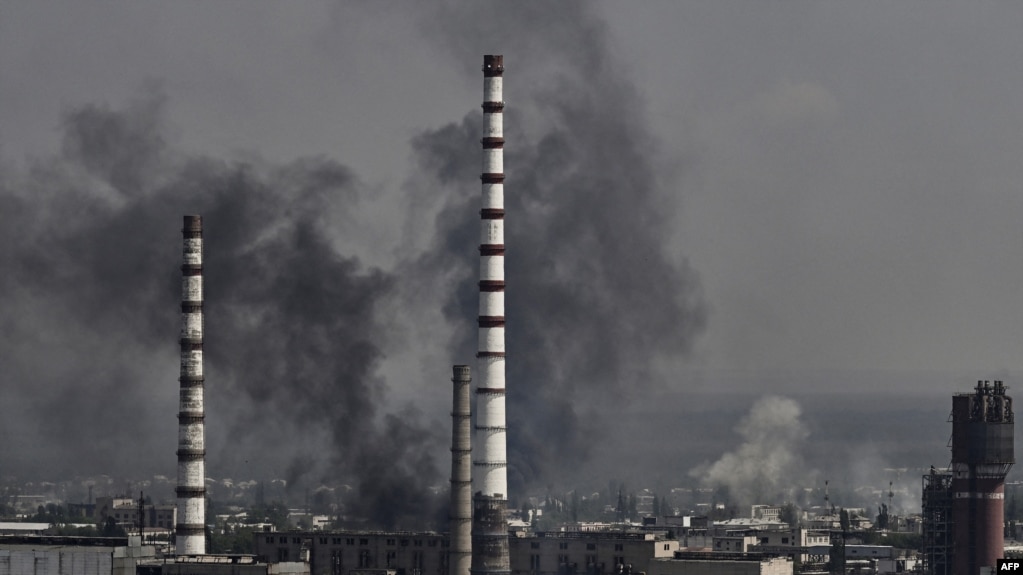LKYIV, (Reuters) – Ukrainian troops have “almost left” Sievierodonetsk after weeks of intense fighting against Russian forces, the mayor of the eastern city said today, signalling the biggest reversal for Ukraine since losing the port of Mariupol in May.
As Europe’s biggest land conflict since World War Two entered its fifth month, a volley of Russian missiles also rained down on military facilities in western and northern Ukraine and on a southern city, Ukrainian officials said.
Russian President Vladimir Putin sent tens of thousands of troops over the border on Feb. 24, unleashing a conflict that has killed thousands and uprooted millions. It has also stoked a global energy and food crisis.
Since abandoning an early advance on the capital Kyiv in what it called a “special military operation”, Russia and its proxies have shifted their main focus to the Donbas, an eastern territory made up of Luhansk and Donetsk provinces.
The retreat from Sievierodonetsk, if confirmed, would bring Moscow close to full control of Luhansk, with Ukrainian troops in the province largely holding out only in Sievierodonetsk’s twin city Lysychansk, across the Siverskyi Donets river.
“Unfortunately, they have almost left the city,” Mayor Oleksandr Stryuk said on national television. He did not confirm whether a full withdrawal was underway after regional authorities said on Friday that Ukraine was set to withdraw its troops from there.
Russia’s pro-Kremlin Izvestia newspaper said one of its correspondents had arrived in the Azot industrial zone of Sievierodonetsk, where Ukrainian forces had been making a stand in recent weeks.
Ramzan Kadyrov, the head of Russia’s Chechnya region which has troops fighting alongside regular Russian army units in Ukraine, said on social media on Saturday that Sievierodonetsk’s industrial zone and airport had been ‘fully liberated’.
The capture of Sievierodonetsk would be likely to seen by Russia as vindication for its switch from its early, failed attempt at “lightning warfare” to a slower grinding offensive which relies more on long-range shelling.
Moscow has recognised Luhansk and Donetsk as independent countries and demanded Ukraine cede the entire territory of the two provinces to separatist administrations.
Kharatin Starskyi, the press officer of a Ukrainian National Guard brigade, said on television on Saturday that the flow of information about the withdrawal from Sievierodonetsk had been delayed to protect troops on the ground.
“During the last (several) days, an operation was conducted to withdraw our troops,” Starskyi said.
Serhiy Gaidai, governor of the Luhansk region, said Russian forces had attacked Sievierodonetsk’s industrial zone on Friday and also attempted to enter and blockade Lysychansk.
MISSILES STRIKES IN WEST, NORTH
Elsewhere in Ukraine, governors of western and northern regions reported multiple missile attacks, indicating that Russia was not limiting its assault to eastern territories.
“48 cruise missiles. At night. Throughout whole Ukraine,” Ukrainian presidential adviser Mykhailo Podolyak said on Twitter. “Russia is still trying to intimidate Ukraine, cause panic and make people be afraid.”
The governor of Lviv region in western Ukraine, Maxim Kozytskyi, said in a video posted online that six missiles were fired from the Black Sea at the Yavoriv base near the border with Poland. Four hit the target but two were destroyed.
In the north, Vitaliy Bunechko, governor of the Zhytomyr region, said strikes on a military target killed at least one soldier, adding that nearly 10 missiles had been intercepted and destroyed.
In the south, Oleksandr Senkevych, mayor of Mykolaiv near the Black Sea, said five cruise missiles hit the city and nearby areas on Saturday. The number of casualties was being clarified.
Reuters was not able to independently confirm the various reports.





